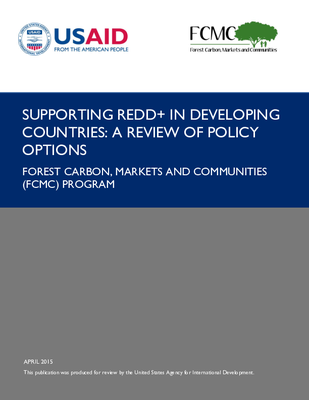Supporting REDD+ in Developing Countries: A Review of Policy Options
The objective of this paper is to evaluate the potential of a range of market and non-market policy options available to developing countries willing to contribute to a global climate change solution by reducing emissions from deforestation and forest degradation, forest conservation, sustainable management of forests, and enhancement of forest carbon stocks (REDD+) and to deliver additional co-benefits. The covered policy options are domestic market-based instruments (MBIs), direct regulation of land clearing, payments for results, and environmental impact assessment.
https://biodiversitylinks.org/projects/completed-projects/forest-carbon-markets-and-communities-fcmc-project/resources/supporting-redd-in-developing-countries-a-review-of-policy-options/view
https://biodiversitylinks.org/projects/completed-projects/forest-carbon-markets-and-communities-fcmc-project/resources/supporting-redd-in-developing-countries-a-review-of-policy-options/@@download/image/image.png
File
Supporting REDD+ in Developing Countries: A Review of Policy Options
Author(s):
Linacre, Nicholas, O’Sullivan, Robert, Rocha, Marcelo, Greenhalgh, Sophy, Ross, David
Publication Date: 2015
DOWNLOAD FILE
The objective of this paper is to evaluate the potential of a range of market and non-market policy options available to developing countries willing to contribute to a global climate change solution by reducing emissions from deforestation and forest degradation, forest conservation, sustainable management of forests, and enhancement of forest carbon stocks (REDD+) and to deliver additional co-benefits. The covered policy options are domestic market-based instruments (MBIs), direct regulation of land clearing, payments for results, and environmental impact assessment.


